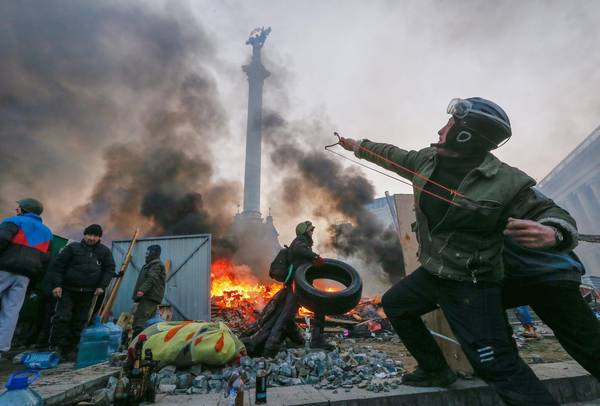Ukraine reshapes New EU, between Moscow & Western
Review 2014: EU integration slows down, but China counts too
04 January, 16:09by Beniamino Pagliaro
(ANSA) - TRIESTE - The Ukraine crisis and the new confrontation between Russia and the Western Countries have definitely dominated the scene in 2014 in the New Europe. Talking about elections, this year recorded Poland's leadership with the Polish Presidency of the Eu Council (former president Donald Tusk was appointed chairman), and it is no coincidence that Poland was among Moscow's sharpest critics.
On February 22, Viktor Yanukovich fled from Kiev. On March 16, Crimea chose independence by voting in a referendum, but the clashes would continue at least until September 20, when the Minsk Agreement was signed. Not only the conflict, however, but also economic sanctions have changed the relations among the countries. Russia, hit by a strong decline in oil prices, has thus reacted.
The outcome of a tense year was finally recorded in December, when Vladimir Putin announced Russia's withdrawal from the South Stream gas pipeline project.
As a consequence, many changes have occurred, all around the new Europe. In Budapest, Viktor Orban decided to support Moscow and cut gas supplies to Ukraine. Belgrade pursued integration with the EU but welcomed Putin with a massive military parade. Riga and Tallinn did not hide their fears and Tbilisi gained the ratification of the Association Agreement with the EU.
Being economically self-sufficient proved to be the only way to avoid being treated like a conquered land. The Central European area is growing more quickly than the eurozone, and Poland has proved to be a dynamic protagonist. The economy grew by 3.2% and will grow by 3.3% in 2015, according to the International Monetary Fund. Croatia continued to experience some difficulties and Slovenia kept on taking measures to save banks and privatize the economy, before voting to form a new government. Serbia is dipping back into a recession, also affected by the floods which hit the country in May.
Romania is regarded as a 'surprise' in 2014, according to some observers, a sort of declaration of democratic maturity. Prime Minister Victor Ponta - favourite to win -, was defeated in the second ballot in the presidential poll. Klaus Johannis, conservative, physicist, mayor of the German minority, conquered Cotroceni Palace.
Throughout the whole area of the New Europe, coalition governments did not go out of style and won in Serbia (with the Conservative Aleksandar Vucic), in Bulgaria and Austria.
The European integration process has not stopped this year, but has slowed down, despite the fact that general election took place in Brussels. The EC praised the progress made in Belgrade in terms of reforms, and harshly criticized the unresolved issues in Montenegro, Macedonia and Bosnia-Herzegovina. In terms of relations between Serbia and Kosovo, which is among the crucial issues to be resolved in order to join the Union, 2014 was a lost year, made even heavier by the diplomatic incident due to the drone which flew over the stadium in Belgrade. It will be Federica Mogherini's job to revitalise dialogue. Albania became an official EU candidate country in June, and the EU Parliament ratified Georgia's association in December.
The first issue to be tackled is that the European Union is not the only party which is interested in the Balkans. In a typical conflict of interests, Germany runs to strengthen its dominant position. Russia's moves are predictable. But there is even China: Premier Li Keqiang has recently spent three days in Belgrade, and Beijing will build the new railway from Belgrade to Budapest. (ANSA).














